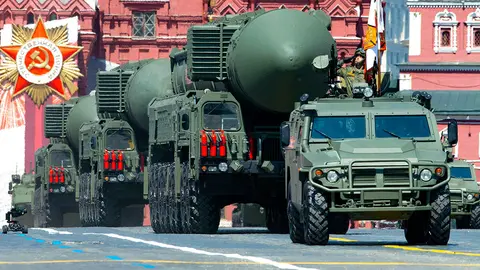NATO reinforces its borders with Belarus in the face of the Wagner crisis

There is a feeling of insecurity in Vilnius. The armed rebellion of the Wagner mercenary group and its leader, Yevgeny Prigozhin, is causing great distrust in Lithuania, the NATO enclave bordering Russia's Kaliningrad region and Belarus that will be at the centre of world geopolitics on 11 and 12 July. The scenario is unprecedented.
In addition to the deployment of Russian nuclear weapons to Belarus and President Lukashenko's threat to use them, there is now the shadow of Progozhin and the transfer of the bulk of his mercenary army to the regime in Minsk. This was the bargain that ended Wagner's military insurrection: the exile of Prigozhin and the opportunity for the soldiers who followed him to join the ranks of the Russian army to "continue serving Russia", or to join the same fate as their leader. But the uncertainty of Prigozhin's next steps, just a few kilometres from Vilnius, dominates attention on all NATO moves.

"We note that Belarus has become a haven for war criminals," were the blunt words of Lithuanian President Gitanas Nauseda, the summit's host. NATO Secretary General Jens Stoltenberg, with whom he met in Vilnius, was equally critical: "We are following the situation in Russia closely. The events of the weekend are an internal Russian affair and a further demonstration of the major strategic mistake Putin made with his illegal annexation of Crimea and the war against Ukraine".
Away from assessments, the meeting in the Lithuanian capital focused on Nauseda's demands to strengthen security. The German Defence Minister accompanying the letter has more than met the country's demands: "We will permanently station 4,000 troops in Lithuania to protect the Alliance's eastern flank", in addition to the 1,300 NATO troops already stationed in Lithuania.

But Germany is not the first to act. Spain has already announced that it will contribute to the security of the summit with its NASAMS anti-missile unit, which will be deployed from Latvia, where it is currently stationed. In any case, Stolteberg has assured that NATO has 300,000 troops ready to intervene in the event of a threat to any NATO member state.
A warning with a long way to go
The Baltic states are NATO's spearhead. Estonia, Latvia and Lithuania are the Atlantic Alliance's borders with Russia, and it is precisely this enclave that is the target of the Kremlin's threats, along with Finland and Sweden. It was one of the key points at the previous summit in Madrid, and will remain so at the next one in Vilnius.

Since the beginning of Russia's invasion of Ukraine, the Baltic states have demanded more security on the eastern flank. NATO has increased its troops on the border with Russia tenfold since February 2022, with more than 40,000 deployed, but the unprecedented military revolt in Prigozhin and nuclear threats have forced Lithuania to insist on further reinforcements.
"We are ready to take additional measures, if necessary, to protect our borders," said Latvian Prime Minister Krisjanis Karins. Land and air borders following Russia's latest moves in the Baltic Sea as part of NATO's Baltic mission.









